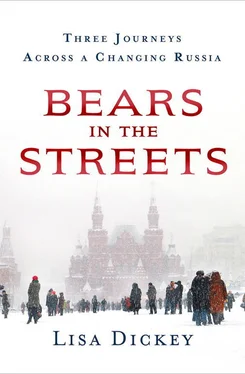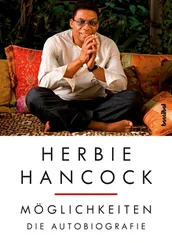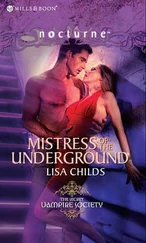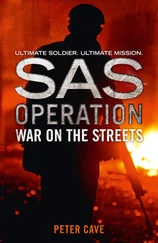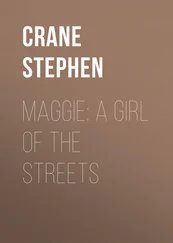On the day David and I arrived, we took a taxi to the little synagogue to see if it was still standing. It was—and Boris Kaufman was there too, looking the same in his long white beard and yarmulke. Boris told us that he still held services, though he no longer allowed the worship of Jesus Christ. “There were several women who wanted to do that,” he said, shrugging. “But in 1996 or so, I told them we had to keep to Jewish religious traditions here. So they left.”
But the bigger news, by far, was that Birobidzhan had a new synagogue. And for the first time in decades, it had a rabbi—an energetic young Israeli named Mordechai Scheiner, who’d arrived in 2002.
This was truly surprising. And the new synagogue complex was even more so: not only was there a beautiful new sanctuary, there were also Sunday school classrooms, a small museum, administrative offices, and a library. The synagogue had a Torah and specially designed ceiling lights that formed a Star of David, and the Sunday school had a computer classroom outfitted with ten brand-new computers. All of this was funded by government and private sources, including the American Jewish Joint Distribution Committee in addition to Russian organizations—and enough money had been earmarked to keep it open a long time. It seemed that the Jewish Autonomous Region had been saved.
And yet… and yet… a different reality emerged when I tried to track down the people I’d spoken with in 1995. Boris’s mentor, Oleg Shavulski, who’d railed bitterly against those who left Birobidzhan, had moved to Germany. Maria Shokhtova, the Yiddish teacher, had moved to Israel. David Waiserman, who’d told me, “This is where my roots are,” had left too, emigrating to Israel. And Alexander Yakubson, the lawyer who’d moved to Israel, then back to Birobidzhan, had returned once again to Israel.
In fact, only three people I’d spoken to in 1995 hadn’t left: Boris Kaufman; union leader Yakov Sherman, who had unfortunately suffered a debilitating stroke; and—most surprisingly—Mikhail Diment, the Sokhnut director who’d spent the whole of the 1990s trying to get his fellow Jews out.
Judging from my admittedly small sample size, it seemed that the exodus from Birobidzhan never really stopped. Yet at School No. 2, a whopping 600 students were now enrolled to study “the languages and culture of the Jewish people”—up from just 100 in 1995. Not all these students were Jewish, but many were. The school’s director, Liliya Komissarenko, told me that this was one of the most telling signs that Jewish culture in Birobidzhan was experiencing a true resurgence.
“But how is that possible, with so many Jews still leaving?” I asked her.
“The more Jews that leave, the more that are left here,” she replied. I looked at her blankly. Was this a riddle?
“Now, many more people here are discovering and embracing their Jewish roots,” she explained. “These are people who, before, had no interest in their Jewish heritage. But now they’re acknowledging who they are.” In other words, Jewish families who’d gone underground during the Soviet era were now, finally, coming back out.
Many others confirmed this. Albina Sergeyeva, director of the Freud Center, told me, “Ten years ago, many of those who left didn’t want to proclaim themselves Jewish. Now, people call themselves Jewish, and they talk about how their grandmothers and great-grandmothers practiced the Jewish faith.” Lev Toytman, who’d come to Birobidzhan as a boy in 1934, said, “After 1917, people forgot who they were. Especially those born after the 1930s and ’40s, they were Pioneers and Communists. The synagogues were closed. But now people will say they’re Jewish. Things have changed.”
Not everybody believed that Birobidzhan’s Jewish population had grown; official estimates put the number at fewer than 4,000. But Vasily Gurevich, deputy chairman of the Jewish Autonomous Region, opined that ultimately “numbers don’t matter. It’s the spiritual life of the town that matters. There may be fewer Jews, but we’ve created better conditions for those who’ve remained.
“Now the young people know what a menorah is,” he concluded. “They didn’t before.”
And if anyone still didn’t know, all they had to do was stroll down to Birobidzhan’s train station, which now boasted a giant menorah out front—one of many Jewish landmarks in the city, including a statue of writer Sholem Aleichem, as well as one of a fiddler in front of the Philharmonic Hall. Yes, Birobidzhan was still a small, swampy, economically challenged outpost, but it did seem in 2005 that the Jewish Autonomous Region would survive.
Ten years later, it was time to find out for sure.
* * *
The morning after my late-night check-in at the Hotel Vostok, I found a different woman seated behind the front desk. “Can you tell me how to get to the synagogue?” I asked her. I remembered that it was in the city center, which was small enough that I hadn’t thought it necessary in 2005 to write down the street address.
“Synagogue?” the woman asked.
“Yes,” I said. “The Jewish… church?” She looked at me quizzically. “It was built in 2004,” I said, “not far from here…” I assumed that she wasn’t Jewish, as the vast majority of Birobidzhan residents weren’t, but did she really not even know what I was talking about?
“Ah, I think I know the place you mean,” she said at last. “Walk out of the hotel and turn left. Go past the Rodina movie theater and the World War II memorial. You’ll start to see some Jewish stars. It’s probably around there.”
I thanked her, then headed out into the early autumn sunshine. The street in front of the hotel had been turned into a pedestrian mall, though the first couple of blocks were bleak, littered with abandoned kiosks and flashing electronic billboards. Once I got past those, however, the city’s sidewalks were spacious and tree-lined, very pleasant for a morning stroll. With its sleepy pace and modest storefronts, Birobidzhan seemed to have changed little since I was here last.
Unlike Vladivostok, with its miles of waterfront, rolling hills, and winding streets, Birobidzhan was a flat grid. The center of town was a rectangle, bounded by the train station to the north, the Vostok hotel to the east, the Bira River and Philharmonic Hall to the south, and School No. 23 to the west. Within that rectangle were most of the local landmarks: the House of Culture, the World War II monument, the Regional Museum, and the synagogue.
Ten minutes into the walk, I turned onto Lenin Street and started seeing menorahs—not “Jewish stars,” but close enough. A long wrought-iron fence was decorated with them, and in front of that stood a silver statue of a Hasid blowing a shofar.
This marked the entrance to the synagogue complex, which was dominated by two large buildings: the synagogue and the Freud Jewish Community Center. The grounds were beautifully tended, with colorful flowers providing a backdrop to a stark black granite stone, a monument to victims of the Holocaust.
I walked into the synagogue’s lobby, but the inner door leading to the sanctuary was closed. Should I knock, or just go in? This was the start of Rosh Hashanah; were there religious reasons why I, a non-Jewish woman, shouldn’t enter? I walked back outside, momentarily stymied. Then it occurred to me that I could text Randi in Los Angeles to ask—she was Jewish; she’d know what to do. She texted back one word—“knock”—and at that moment, I looked up to see a little boy peering out the synagogue window.
I waved, and he waved back. Then a man appeared in the window, and he beckoned me in. “Rabbi Riss is arriving from Khabarovsk today,” he told me. “Come back in two hours.” So Mordechai Scheiner had moved on, but Birobidzhan had a new rabbi. This was a good sign.
Читать дальше
